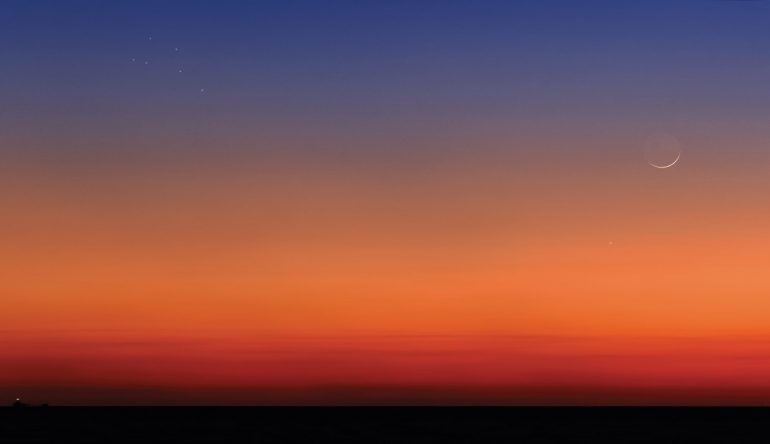I am thinking now about Job and Interstellar. You know… the ancient story written a few thousand years ago and Christopher Nolan’s new space-odyssey blockbuster. They have a lot to say to each other.
The premise of Interstellar is perhaps best summed up by Michael Caine’s character who claims “we aren’t made to save the world… we’re meant to leave it.” It’s a long story how the world of Interstellar has come to this point, and one which the film does not delve deeply. Basically, Earth’s food supply is running out. Dust bowls and blights have killed off all of the world’s crops except corn. In the film we find that corn is also about to fail and that the only option for humanity’s survival is to find another inhabitable planet.
Now, I love a good space thriller.
Chewbacca and I go way back. Spock has a lot of wisdom to offer. Tom Hanks was great in Apollo 13. Great flicks, all of them. And I really did enjoy Interstellar, too. It was a fun story and highly entertaining. It was a blast to watch on the big screen (pun intended) and there are scenes both poignant and beautiful. Oh. And there’s also that part where Interstellar represents a worldview that is antithetical to human flourishing and is a recipe for disaster. The film is indicative of western culture’s attitude towards science, faith, and stewardship. It reminded me that if we don’t change our ways, we are most likely, as the prophets of old put it, screwed. Again, other than these minor quibbles, Interstellar was a great flick.
The varied relationships between the protagonist Cooper (played by Matthew McConaughey) and his two children offer us a good lens into my beef with the film. On the one hand, we have Cooper’s daughter, Murph. Murph is a brilliant young lady. A real gem. She shows bright promise in pursuing studies in the sciences (which, in the world of Interstellar, is frowned upon). Cooper takes great delight in Murph—she, like him, believes that technology is of profound importance and that science is the key to a hopeful future. Cooper and Murph know that the narrow-minded worldview that rejects the wonders of science can only lead to disaster.
And then there’s Tom, Cooper’s son. Ah, Tom, bless his heart. Tom is an anomaly to his father. He isn’t as sharp as his science-loving sister. Tom wants to be a farmer. He loves his life amidst the crops. Tom is portrayed as quaint and shortsighted, what with his intense loyalty to home and family and whatnot. In the film, Cooper tries hide his disappointment in his son and does his best to be supportive, though we all know that he wishes Tom could do something more important. Farming, for Cooper, isn’t be something to be admired—it is only for the closed-minded simpletons who surround him. Tom just doesn’t get it. What an ignorant jerk, that Tom. If only he could grasp the fact that only the powers of technology can save him! Never mind the fact that the good people of Interstellar probably wouldn’t have been in this mess to begin with if sustainable agriculture had been present from the start. Nope, the real heroes in Interstellar are the scientists and mathematicians and the techno-savvy working underground to save the day. Is this sounding familiar? It should.
Now We Just Look Down
Before he rockets into the Great Beyond, Cooper cracks a beer and wearily looks out over a landscape of dusty crops. He laments that humans were meant to be “pioneers” not “caretakers,” and that “we used to look up at the sky and wonder about our place in the stars. Now we just look down and worry about our place in the dirt.”
His disgust is evident. He comments that while human beings were born on earth, they aren’t meant to die here. (I’m not kidding. These are actual lines). For Cooper, the world is something to be escaped, something to be left behind. (Hmm… Left Behind… those words seem to remind me of…) Anyway, according to Cooper, we are to always be pushing further and farther, striving for more and more. Limits do not promote human flourishing—they hinder it. So goes the narrative of Interstellar. So goes the narrative of Western society.
I mentioned at the beginning that this is a story about Interstellar and Job. So what does Job have to do with this? Perhaps a quick refresher is in order. Job was a righteous man who was once very prosperous. After a crazy wager between God and Satan, Job loses everything, including his wealth, health, and family. He has cried out to God for an answer. And for thirty eight chapters no answer is given. Instead, Job’s friends feed him with theodicies and explanations that don’t quite fit. Job is not satisfied. Finally, in dramatic fashion, God speaks directly to Job. God barrages Job with a series of questions that he cannot answer—questions that show the beauty and wildness of the world, questions that demonstrate Job’s finitude and limits within the created order, and questions that demonstrate God’s mysterious, yet sovereign control.
Which brings us to our Interstellar related passage. In Job 38:31-33 we find God asking Job, just as in Interstellar, to look up and wonder about his place in the stars. God questions Job out of the whirlwind:
Can you bind the chains of the Pleiades,
Or loose the cords of Orion?
Can you guide the constellations in their appointed season,
Or shepherd the Aldebaran with its children?
Have you mastered the laws of the heavens?
Can you set their rule on the earth?
Before you answer in the affirmative and start packing your bags for interstellar travel, a bit of exegesis is in order. These verses are strange. You see, the inclusion of all this celestial talk makes for a very odd interlude in Job 38. The rest of the chapter and pretty much the rest of the whirlwind speech is concerned with things on earth—with wild animals, with weather, with water, with seasons. Why all this talk of constellations and stars? Some scholars have even wondered if the verses have been misplaced, and if they should belong here at all. It turns out, however, that for those in the Ancient Near East, such as the author of Job, there were no such clear distinctions between the night sky and the dirt beneath them. Carol Newsom writes that actually, these constellations were associated with the “seasonal changes in rainfall,” and “the references to binding and losing would refer to the ability to control not only the movement of the stars but also the rainy and dry seasons associated with them.”[ref]Carol Newsom. New Interpreter’s Bible, Volume IV (Abingdon, 1996), 605.[/ref]
From the perspective of Job, then, we see that Interstellar’s Cooper is only half right. We are meant to look up and wonder about our place in the stars, yes. They should fill us with awe and wonder. But those same stars should point us right back to the very dirt beneath our feet. This is what Job must understand from God’s rhetorical questioning. Job is a man who knows the stars so well that he can tell when it is best to plant his crops simply by gazing at the constellations. He knows the natural world intimately. But even with such intimate knowledge, Job is meant to realize his place in the universe. Job looks into the stars and sees that he is but one small person in the midst of a deeply complex and intimate system. And part of his place in that system is to be a caretaker of the land beneath his feet. Anything more than this is too much for him. Job learns “cosmic humility,” as Richard Bauckham puts it.[ref]Richard Bauckham. The Bible and Ecology. (Waco: Baylor University Press, 2010), 44.[/ref]
“Have you mastered the laws of the heavens?” God questions.
“No,” is the expected reply.
Where does our hope lie?
The characters of Interstellar put their trust and hope in mathematical guesses, black holes, wormholes, and the salvation of technology. They have trashed one world—now it is time to consume another. God is not part of the conversation.
So, too, goes our society’s thinking. We think we can and will techno-solve our way out of global warming. We think by pumping artificial pesticides and fertilizers into our food that we will feed the world, despite the fact that this simply is not sustainable and poisons the very thing that feeds us in the process. We don’t have the solutions yet? Don’t worry. The scientists will figure it out. Never mind that we are in a period of mass extinction. Never mind that severe weather will become more common. Let’s put our faith in astronauts. Let’s put our faith in Monsanto and Big-Ag. Surely they will save us. Let us not solve the root of our problems, for we will not like the answer we find.
“Can you bind together the Pleiades? Can you move the stars through the night sky?”
No, no, no.
Here’s a crazy idea
Call me crazy, but I’ll put my faith in the Maker of the Heavens and the earth. I’ll put my faith in another narrative, a narrative that says that we are limited creatures and that being limited is, in itself, a blessing. I’ll put my faith, as Wendell Berry writes, in “the two inches of humus/ that will build under the trees/ every thousand years.”[ref]Wendell Berry, Manifesto: The Mad Farmer Liberation Front[/ref] I’ll put my faith in tradition and stewardship. I’ll put my faith in the caretakers and not the pioneers.
We may indeed wind up with an Earth resembling the Earth of Interstellar if we don’t change course. Yes, we need engineers and doctors. Yes, we should look into the night sky with wonder. I’m just not betting on the astronauts to save the day. I guess what I’m trying to say is that I’m throwing my lot in with the Toms of this world. I’m throwing my lot in with the lesson that Job learns. Limits are good. We must learn them again.





